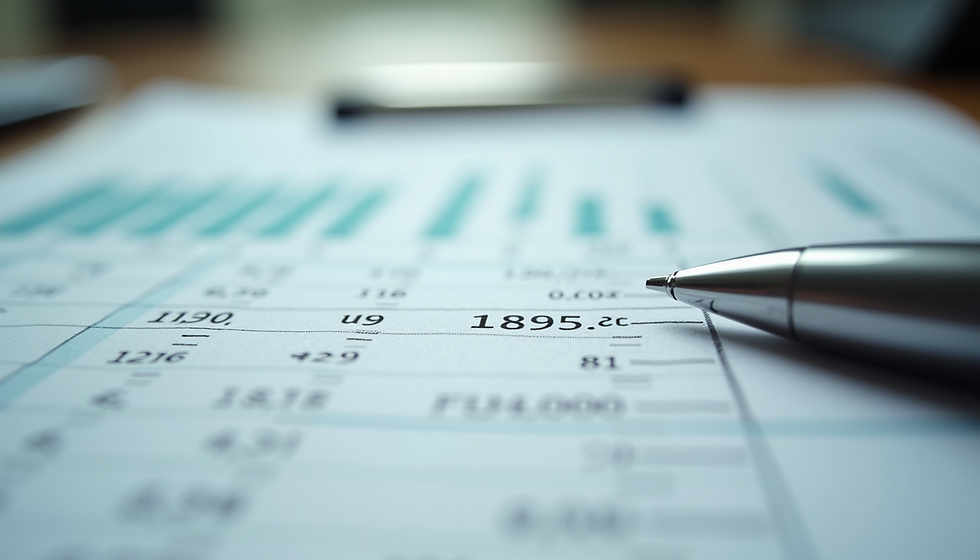Mastering the Essentials of Property Management Accounting
- joyce-orr
- Aug 10
- 4 min read
Managing the financial side of your rental properties or real estate investments can feel overwhelming. But with the right approach, you can gain control and clarity over your finances. This guide will walk you through essential property accounting tips that help you stay organized, compliant, and profitable. Whether you manage a few units or a large portfolio, these practical strategies will make your accounting tasks simpler and more effective.
Key Property Accounting Tips to Keep Your Finances on Track
Keeping your property finances in order is crucial for making smart decisions and avoiding costly mistakes. Here are some foundational tips to help you manage your accounting efficiently:
Separate Personal and Business Finances
Open a dedicated bank account for your rental income and expenses. This separation simplifies tracking and reduces confusion during tax time.
Track Every Expense and Income Item
Record all transactions related to your properties, including rent payments, maintenance costs, utilities, and property taxes. Use accounting software or spreadsheets to keep everything organized.
Keep Receipts and Documentation
Store digital or physical copies of invoices, receipts, and contracts. These documents support your records and are essential if you face an audit.
Set Up a Consistent Bookkeeping Schedule
Dedicate time weekly or monthly to update your books. Regular maintenance prevents backlog and errors.
Use Property-Specific Accounting Software
Consider tools designed for real estate professionals. They often include features like tenant tracking, lease management, and automated reports.
Understand Your Tax Obligations
Know which expenses are deductible and how to report rental income properly. Consult a tax professional if needed.
By following these tips, you’ll build a solid foundation for managing your property finances confidently.

Understanding the Importance of Accurate Property Accounting
Accurate accounting is more than just number crunching. It’s about gaining insights that help you grow your investments and avoid financial pitfalls. Here’s why it matters:
Improved Cash Flow Management
Knowing exactly when rent is due and when bills must be paid helps you avoid late fees and maintain steady cash flow.
Better Budgeting and Forecasting
Detailed records allow you to predict future expenses and plan for property improvements or acquisitions.
Simplified Tax Filing
Organized financial data reduces stress during tax season and helps you maximize deductions.
Enhanced Decision Making
Clear financial reports reveal which properties are most profitable and where you might need to cut costs.
Compliance and Legal Protection
Proper accounting ensures you meet regulatory requirements and have documentation ready if disputes arise.
Investing time in accurate accounting pays off by giving you peace of mind and a clearer path to success.

What is GAAP in Property Management?
GAAP stands for Generally Accepted Accounting Principles. These are the standard guidelines and rules that govern financial reporting in the United States. Understanding GAAP is important for property managers and investors because it ensures your financial statements are consistent, transparent, and reliable.
Here’s how GAAP applies to property management:
Consistency
GAAP requires you to use consistent accounting methods, making it easier to compare financial data over time.
Accrual vs. Cash Basis Accounting
GAAP favors accrual accounting, which records income and expenses when they are earned or incurred, not just when cash changes hands. This gives a more accurate financial picture.
Revenue Recognition
Rent and other income should be recognized in the period they relate to, not necessarily when received.
Expense Matching
Expenses should be matched with the revenues they help generate, providing a clearer view of profitability.
Disclosure Requirements
GAAP requires clear disclosure of accounting policies and any significant financial information.
While GAAP compliance is mandatory for public companies, following these principles in your property accounting helps maintain professionalism and accuracy. It also prepares you for potential audits or when seeking financing.

Practical Steps to Streamline Your Property Accounting Process
To make your accounting process smoother and less time-consuming, try these actionable steps:
Automate Rent Collection and Payment Tracking
Use online payment platforms that automatically record transactions and send reminders to tenants.
Implement Cloud-Based Bookkeeping
Cloud software allows you to access your financial data anytime and collaborate with your accountant or bookkeeper easily.
Categorize Transactions Clearly
Create categories like maintenance, utilities, mortgage, and insurance. This helps in generating detailed reports and identifying tax deductions.
Reconcile Bank Statements Monthly
Compare your records with bank statements to catch errors or unauthorized transactions early.
Set Up Alerts for Important Deadlines
Use calendar reminders for tax payments, insurance renewals, and lease expirations.
Hire a Professional When Needed
If accounting becomes too complex or time-consuming, consider outsourcing to experts who specialize in property management accounting.
By adopting these steps, you reduce errors, save time, and gain better control over your property finances.
Building Confidence in Your Property Financials
Mastering property accounting is a journey, but with consistent effort, you’ll build confidence in your financial management. Here are some final tips to keep you on track:
Review Financial Reports Regularly
Monthly or quarterly reviews help you spot trends and make informed decisions.
Stay Educated on Tax Laws and Regulations
Real estate tax rules can change. Keep yourself updated or work with a knowledgeable advisor.
Plan for Unexpected Expenses
Set aside reserves for repairs or vacancies to avoid cash flow surprises.
Communicate Clearly with Tenants and Vendors
Transparent communication helps prevent disputes and ensures timely payments.
Leverage Technology and Professional Help
Don’t hesitate to use tools and services that simplify your accounting tasks.
With these strategies, you’ll not only manage your properties more effectively but also free up time to focus on growing your portfolio.

Taking control of your property accounting is a powerful step toward financial clarity and success. By applying these tips and best practices, you’ll create a reliable system that supports your real estate goals. Remember, expert help is always available to guide you through the complexities, so you can focus on what matters most - growing your investments with confidence.



Comments